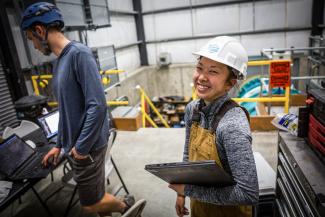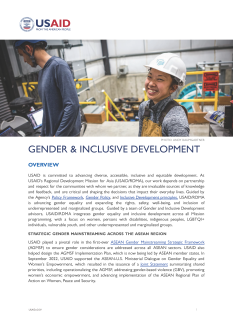OVERVIEW
USAID is committed to advancing diverse, accessible, inclusive and equitable development. At USAID’s Regional Development Mission for Asia (USAID/RDMA), our work depends on partnership and respect for the communities with whom we partner, as they are invaluable sources of knowledge and feedback, and are critical and shaping the decisions that impact their everyday lives. Guided by the Agency’s Policy Framework, Gender Policy, and Inclusive Development principles, USAID/RDMA is advancing gender equality and expanding the rights, safety, well-being, and inclusion of underrepresented and marginalized groups. Guided by a team of Gender and Inclusive Development advisors, USAID/RDMA integrates gender equality and inclusive development across all Mission programming, with a focus on women, persons with disabilities, indigenous peoples, LGBTQI+ individuals, vulnerable youth, and other underrepresented and marginalized groups.
STRATEGIC GENDER MAINSTREAMING ACROSS THE ASEAN REGION
USAID played a pivotal role in the first-ever ASEAN Gender Mainstreaming Strategic Framework (AGMSF) to ensure gender considerations are addressed across all ASEAN sectors. USAID also helped design the AGMSF Implementation Plan, which is now being led by ASEAN member states. In September 2022, USAID supported the ASEAN-U.S. Ministerial Dialogue on Gender Equality and Women’s Empowerment, which resulted in the issuance of a Joint Statement summarizing shared priorities, including operationalizing the AGMSF, addressing gender-based violence (GBV), promoting women’s economic empowerment, and advancing implementation of the ASEAN Regional Plan of Action on Women, Peace and Security.
PEACEBUILDING FOR EXPANDED LGBTQI+ RIGHTS
USAID’s Networks for Peace partners with the International Network of Engaged Buddhists (INEB) to bridge faith and pride by creating an inclusive regional peacebuilder network that include religious actors and gender and LGBTQI+ practitioners to promote religious harmony and social cohesion. In the Deep South of Thailand, youth-focused Association Luukrieang, a sub partner under USAID’s Together Activity, demonstrated its leadership using an evidence-based approach to improve and empower marginalized and vulnerable children, youth, and women.
CONNECTIONS FROM SPACE TO VILLAGE THROUGH INCLUSIVE CLIMATE ACTIONS
USAID and NASA partner with the Asian Disaster Preparedness Center (ADPC) through SERVIR Southeast Asia (SERVIR SEA) to use publicly available satellite technologies to address transboundary climate issues, such as air pollution, floods and droughts. SERVIR SEA’s Gender Analysis Tool integrates gender equality and social inclusion into climate adaptation and mitigation efforts by implementing inclusive co-creation processes; and providing contextualized and disaggregated geospatial data, including information on gender and vulnerability, to inform inclusive disaster risk management and relevant climate actions.
NATURAL RESOURCES THAT SUSTAIN COMMUNITIES
USAID partners with the Mekong River Commission (MRC) to safeguard the region’s natural resources, building a sustainable future for the Mekong River and its surrounding communities. Leveraging the MRC’s Gender Action Plan, this collaboration focuses on inclusive engagement and action to protect the Mekong River. In addition, USAID Sustainable Fish Asia Technical Support empowers women fishers, small-scale fishers, and youth as leaders in the industry so they can collectively take action to advocate for policies that protect their rights.
HEALTHCARE ACCESS FOR ALL
Gender inequality is a critical barrier to reaching HIV epidemic control. Through the U.S. President’s Emergency Plan for AIDS Relief (PEPFAR) program, USAID engages key LGBTQI+ populations across a cascade of services in Thailand and throughout the region. The activity strengthens civil society partnerships with clinical care providers to enhance the quality and coverage of HIV services for men who have sex with men and transgender women, advancing locally-led solutions to address the HIV epidemic. As a result, civil society organizations led by key populations contributed to 60 percent of Thailand’s pre-exposure prophylaxis (PrEP) targets, reducing new HIV infections among young key populations.
LEADERSHIP OF ETHNIC TIBETAN WOMEN
USAID’s assistance to Ethnic Tibetans Project empowers women in traditional Tibetan communities by removing barriers to their full participation in economic activities. Through the program, USAID promotes gender equality in efforts to support livelihoods, conserve natural resources, and preserve cultural heritage. In 2023 alone, 779 women have engaged in income-generating activities, formed professional networks, and played key roles in health, education, employment, and environmental conservation training.
CONTACT INFORMATION
USAID/RDMA Program Office—Gender and Inclusive Development Team
USAIDRDMAGID@USAID.gov


